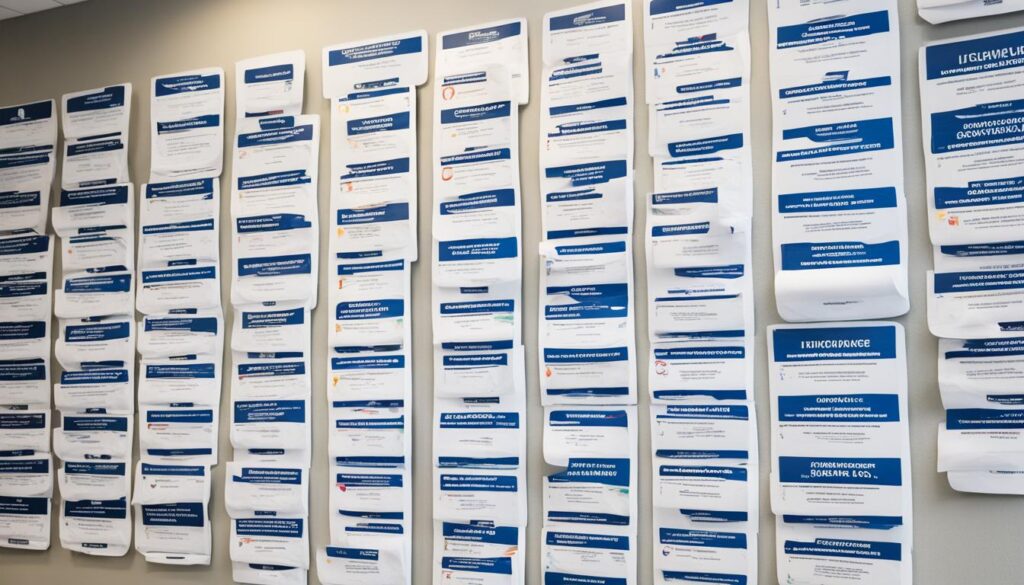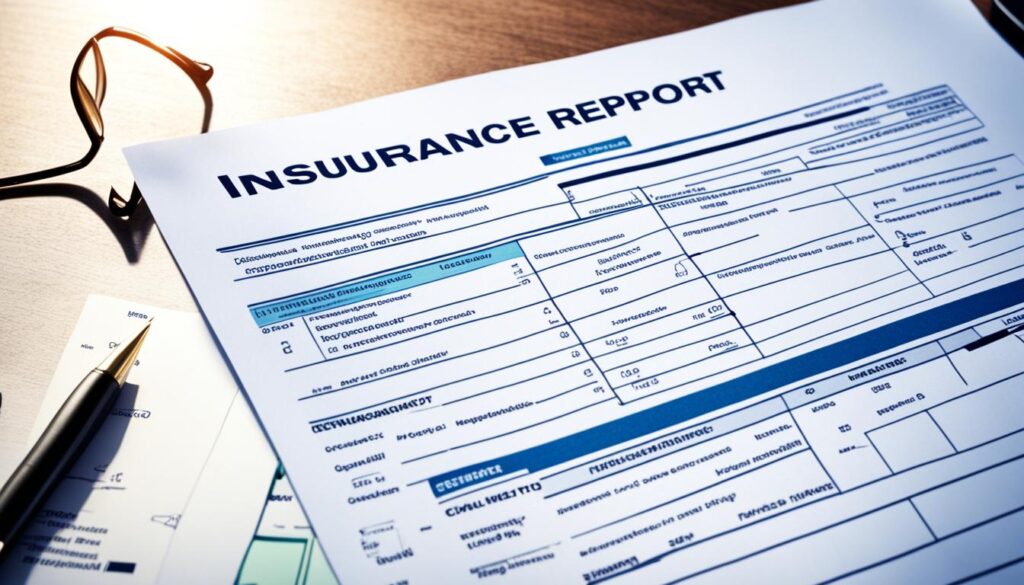Insurance compliance ensures companies follow many rules. These rules aim to protect consumers, keep finances stable, and maintain trust in the insurance market. They cover areas like fighting money laundering, protecting consumer info, and making sure companies are financially strong.
State insurance departments and the NAIC help oversee insurance rules. They make sure companies act ethically, are clear with customers, and have the money to meet their promises.
Following the rules is more than checking boxes. It’s key to running insurance businesses well and responsibly. By meeting compliance, companies lower their legal and image risks. They prevent fines and show they run their business in an honest and open way.
This is important for keeping people’s trust and making sure the market stays solid and fair.
Key Takeaways
- Insurance compliance covers rules that protect consumers and the market and keep finances steady.
- State insurance departments and the NAIC make sure companies follow the rules.
- Sticking to these rules wards off legal problems, keeps a good name, and shows a dedication to running a clean business.
- It helps keep people trusting insurance and the market stable.
- Doing compliance well needs looking at risks, regular checks, and keeping an eye on things.
Introduction to Insurance Compliance
Insurance compliance means staying true to laws, rules, and ethics in the insurance world. It makes sure insurance companies work honestly, protect their customers, and keep the insurance business strong.
Definition and Significance
Insurance compliance is all about obeying laws and standards. It’s essential for insurance firms to avoid risks, be clear, and trust their clients. Following these rules helps companies stay financially healthy, act right, and dodge fines or bad publicity.
Regulatory Bodies and Oversight
The insurance regulatory framework sets the scene for how insurance works. This includes the rules and the people who make sure companies are doing right. Main groups include state regulators, NAIC, and IAIS. They give licenses, check on the companies, protect customers, and make sure the market is fair.
State regulators watch over insurance companies locally by making sure they follow the rules. They also check their money situation and take care of customers. On a larger scale, NAIC and IAIS help make rules work on a wider stage and manage new risks. They aim to make insurance standards similar in various markets.
“Compliance is not just about following the rules – it’s about building trust, mitigating risks, and ensuring the long-term sustainability of the insurance industry.”
Insurance Compliance Regulations and Requirements

In the United States, each state mainly handles insurance rules. The McCarran-Ferguson Act defines this. The National Association of Insurance Commissioners (NAIC) helps set rules and guides insurance companies. But states can change NAIC rules to fit their own laws.
State Regulations and NAIC
The NAIC creates model laws for states to follow. This helps keep insurance rules similar nationwide. Rules cover things like getting a license, how much money companies need, and keeping customers safe.
Federal Laws and Agreements
States mostly run insurance, but the federal government and others help. They focus on big issues, like insurance for terrorism or floods, that go beyond state lines. The U.S. Treasury’s Federal Insurance Office looks at fairness and regulation in the insurance market.
Internationally, the International Association of Insurance Supervisors (IAIS) sets standards for good insurance oversight. This is to make sure insurance supervision is strong everywhere.
| Regulatory Body | Scope of Oversight |
|---|---|
| State Insurance Departments | Licensing, capital requirements, financial reporting, market conduct, consumer protection |
| National Association of Insurance Commissioners (NAIC) | Developing model laws, regulations, and guidelines for state adoption |
| U.S. Federal Government | Terrorism risk insurance, flood insurance, interstate insurance issues |
| International Association of Insurance Supervisors (IAIS) | Developing principles, standards, and best practices for effective insurance supervision |
Because insurance rules are so complex, knowing and following them is key. It’s important to keep up with state insurance regulations, NAIC insurance regulations, federal insurance regulations, and international insurance regulations. Doing this helps keep the insurance market stable, fair, and safe for consumers.
Anti-Money Laundering (AML) and Consumer Data Protection

The insurance industry is often targeted by those looking to launder money. This makes the fight against money laundering a top concern for insurance companies. They have to follow strict rules and examine their customers carefully to stop their services from being used for illegal activities. This commitment helps keep the insurance world honest and protects against financial crimes.
Insurers also handle a lot of private information from their customers. It’s their job to closely follow data privacy laws to keep this information safe. Doing so builds customer trust and shields against the fallout from data breaches.
Combating Money Laundering in the Insurance Sector
Insurance firms have to stick to hard AML rules to prevent their offerings from being used in money laundering schemes. This involves:
- Setting up strong Know Your Customer (KYC) and customer check systems
- Watching over transactions and customer behavior for any signs of shady dealing
- Telling authorities right away if anything suspicious pops up
- Making sure all staff know how to spot and stop money laundering
- Keeping AML guidelines up to date through regular checks and changes
Safeguarding Consumer Data in the Insurance Industry
Since insurance companies deal with a ton of personal and financial data, keeping it all private is key. They must:
- Put strong safety measures in place to avoid hacks and data leaks
- Get permission from customers to collect and use their data
- Be clear and honest with customers about how they handle data
- Make sure their data rules stay up to date with any new laws
- Teach every employee who works with data how to protect it
| Compliance Requirement | Key Considerations |
|---|---|
| Anti-Money Laundering (AML) |
|
| Data Privacy |
|
By making insurance AML compliance and insurance data privacy compliance a priority, insurance firms can show they do business the right way. This not only keeps customer trust but also shields against the hefty penalties of breaking these rules.
Licensing and Registration Compliance

In the insurance world, following rules related to licenses and registration is very important. This matters for insurance firms and agents. The rules are set by each state. Companies and agents need the right licenses. This lets them sell insurance legally in each area. It also makes sure they follow certain standards.
Companies have to get permission from state insurance departments to operate. If a company works in its home state, it needs to regularly check and update its license. Businesses from out of state follow a different process to get a license. They can often do this more easily due to agreements between states.
Agents need licenses too, for the states where they work. These show they know what they are doing and will offer good service. They have to keep renewing their licenses to show they still meet the state rules.
The Importance of Licensing and Registration
Following insurance licensing rules and company registration is key for many reasons:
- It makes sure customers get trustworthy services from providers and agents.
- It helps keep the insurance industry strong and reliable by controlling who can start and continue in the market.
- It creates a fair environment for all companies to compete.
- It allows the government to make sure companies and agents do what they should.
Sticking to these rules improves the insurance world. It makes it a better place for both companies and customers.
“Complying with licenses and rules isn’t just for show. It’s a big part of making the insurance industry honest and responsible.”
Financial Reporting and Solvency Compliance

Insurance companies have to follow strict rules about their money. They must provide detailed yearly finance reports and keep enough money in reserve. They also must be very clear about how they run their business. This helps keep insurers healthy and within the rules, making sure they can pay what they owe.
Capital Requirements and Reserves
Insurers have to keep a certain amount of money to deal with risks. These rules are made by groups that watch over insurance. They check each company’s money, reserves, and how stable they are. This shows if insurers can pay out if they need to.
Disclosure and Transparency
Being clear is a big part of doing insurance right. Insurers have to tell customers all about their policies and what’s included. They also have to share financial details. This includes info on their insurance financial reporting, insurance solvency requirements, insurance disclosure requirements, and insurance transparency.
“Maintaining financial stability and transparency is critical for the insurance industry to build trust with consumers and regulators alike.”
Following these rules helps insurance companies show they’re solid. It protects those they insure and keeps the insurance world safe and steady.
| Compliance Requirement | Description |
|---|---|
| Annual Financial Statements | Insurance companies must give detailed yearly financial reports. These include their assets, debts, and how they’re doing financially. |
| Capital and Reserve Requirements | Insurers have to keep a minimum of money and reserves. This is to cover any possible problems. These rules are made by both states and nationally. |
| Financial Disclosure | Insurers need to be open about their finances. This includes their insurance financial reporting, insurance solvency requirements, insurance disclosure requirements, and insurance transparency. |
Market Conduct and Consumer Protection Compliance
Insurance companies must follow strict rules for their ads, marketing, and how they handle claims and complaints. They must be careful about insurance advertising compliance, insurance marketing compliance, insurance claims compliance, and insurance grievance handling. This is key to protecting people and keeping the insurance world honest.
Advertising and Marketing Standards
Insurance firms need to tell the truth in their ads. They should be honest and not trick people. Companies should follow rules about what they have to say in ads and sales. This way, they can earn people’s trust by sticking to insurance advertising compliance and insurance marketing compliance rules.
Claims Settlement and Grievance Handling
Insurers have rules they must follow when they pay out claims. They should work quickly and fairly to solve issues. Making sure to meet deadlines and handle complaints well is important. This shows their commitment to following insurance claims compliance and insurance grievance handling guidelines.
“Maintaining compliance with insurance regulations is not only a legal requirement, but also a critical aspect of building trust and protecting the interests of insurance consumers.”
Focusing on fair market behaviors and keeping customers safe shows that insurers are ethical. It helps them gain trust and keeps their customers happy in the long run.
Insurance compliance
Keeping up with insurance rules is key for insurance companies. It helps them stay stable financially. It also keeps their customers’ trust, which is vital for the whole industry. Using good tools to check and manage compliance is crucial. It lets insurers find and solve problems early.
Importance of Compliance Monitoring
Ensuring insurance compliance means checking a company’s work often. This includes looking at their papers and following many laws and rules. Insurers might do checks inside their company or get checked by outside groups. Addressing compliance issues early helps avoid problems like fines and a bad reputation.
Risks of Non-Compliance
Not following insurance rules can harm insurance companies a lot. They might face big fines, lose their license, or hurt their reputation. When they don’t follow rules, they are more open to fraud and data theft. They could also lose money if they don’t fight fraud well. Handling compliance poorly can hurt an insurer’s money and its ability to help customers.
Staying on top of compliance is a must for insurance firms. They should always be checking and fixing compliance issues quickly. Doing so keeps their name good, protects customers, and supports the industry’s overall health.
| Consequences of Non-Compliance | Risks of Insurance Non-Compliance |
|---|---|
|
|
“Effective compliance programs are essential for insurance companies to maintain financial stability, protect their customers, and avoid the serious legal and reputational repercussions of non-compliance.”
Building a Robust Compliance Framework
Creating a strong insurance compliance framework is key for any company. It starts from the top. Senior leaders set the tone by showing how important compliance is. This helps everyone in the company work together to follow rules and best practices.
Tone from the Top and Cross-Functional Collaboration
The top leaders must lead by example when it comes to compliance. They need to make it clear that following rules and being ethical are top priorities. Teams from different parts of the company should also join forces to make compliance part of everything they do.
Risk Assessment and Auditing
Taking an active approach to identifying and understanding risks is crucial. Companies need to review what they’re doing often. This includes looking at new rules, industry changes, and areas where they might not comply correctly. Both internal and external audits are important. They help companies find and fix any issues before they become big problems.
“Effective compliance is not just about following the rules, but about creating a culture that prioritizes ethical behavior and responsible business practices.”
Creating a solid insurance compliance framework involves everyone in the business. Senior leaders should make sure everyone knows the importance of compliance. Teams from all over the company should also work together. This makes sure compliance is part of everything the business does, reducing risks.
| Key Components of a Robust Insurance Compliance Framework | Benefits |
|---|---|
|
|
Challenges and Solutions in Insurance Compliance
The world of insurance compliance is always changing. This brings both hurdles and chances for insurers. Due to new laws and norms, firms must update their insurance compliance programs fast. Also, the risks from cyber attacks and financial crimes are getting bigger. So, they need fresh insurance compliance plans and tools.
Regulatory Changes and Emerging Risks
Dealing with new regulations and risks needs a keen, forward-looking stance on insurance compliance. It means always keeping an eye on the rules, working with others in the field and with regulators. And spotting issues early.
Technology and Automation
Using insurance compliance technology and automation can make insurance compliance work better and swifter. Tools that watch and report issues automatically can check insurance compliance everywhere and catch problems right away. Also, complex calculations and automated learning can find fraud, understand risks, and make the insurance compliance work better.
This move means insurance firms can make their insurance compliance tasks smoother, cut down on mistakes, and put more focus on crucial insurance compliance plans. These ensure their customer’s safety and keep the industry honest.
“Embracing technology and automation is crucial for insurers to stay ahead of the curve and maintain a robust insurance compliance framework.”
Compliance Training and Education
To keep up a strong insurance compliance culture, ongoing training is key. This training covers laws, rules, and the company’s own policies. It also teaches how to spot and report issues.
This ensures all workers know their role in keeping things above board. It helps the entire team work together in meeting ethical and legal standards. Such an approach not only makes compliance better but also builds a team spirit of shared duty.
Importance of Continuous Learning
The insurance field changes a lot. This means insurance compliance education needs to keep up. Companies need to always offer new training and refreshers to keep everyone in the know.
- Make sure every staff member, no matter their role, gets good insurance compliance training.
- Include cases and real examples in the training to make it more effective.
- Tailor the lessons to fit the different needs of each team, so everyone learns what matters most to them.
Fostering a Culture of Compliance
Formal training alone won’t cut it. Companies need to make a culture where following the rules is just how things are done. They can do this by:
- Having leaders who show they’re serious about doing the right thing.
- Keeping the conversation open so anyone can speak up about problems.
- Rewarding those who go above and beyond in making sure the company does things right.
This kind of investment in training and culture makes a big difference. It equips staff to always work at their best, both ethically and legally.
Also Read: Your Essential Guide To Travel Insurance
“Compliance is not just a regulatory requirement, but a strategic imperative for insurance companies. Investing in employee education and training is the foundation for building a resilient compliance framework.”
Conclusion
Insurance compliance is incredibly important. It helps companies protect their customers and keep their finances stable. This way, the market stays honest and reliable for everyone.
To be compliant, companies need to follow all rules at the state and federal level. They must also regularly check and improve their practices. Using technology helps a lot too.
As time goes on, the insurance world will keep changing. Staying ahead with smart strategies is key for companies. They should always keep up with new rules, assess risks well, and train their staff. Doing this helps them steer clear of trouble and earn their customers’ trust.
In the end, following the rules is critical for any company in insurance. Those that focus on doing it right will have a smoother journey ahead.
FAQs
What is insurance compliance and why is it important?
Insurance compliance means the rules and steps insurance companies take to follow laws. It’s key for them to stay financially strong and act right. This also protects people and stops bad things from happening to their name.
What is the insurance regulatory framework and who are the key regulatory bodies?
The regulatory setup for insurance includes all the rules and groups that make sure insurance works well. Top bodies are state regulators, the NAIC, and the IAIS. They keep the insurance world safe and fair.
What are the key insurance compliance regulations and requirements?
Companies must obey strict laws against illegal cash or AML, plus rules for protecting customer info. They also need the right licenses, must report their finances correctly, and follow customer protection rules.
How do insurance companies ensure compliance monitoring and address the risks of non-compliance?
Insurance firms check that they’re following the rules by keeping an eye on things all the time. They watch for signs they might break a rule. Not following rules closely can lead to big fines, getting in trouble with the law, and harm to their reputation.
What are the key elements of a robust insurance compliance framework?
A strong plan to follow the rules needs everyone to care, not just the top bosses. It should always check for new risks and use technology to help. By doing this, obeying the law becomes easier and more effective.
What are the challenges and solutions in the insurance compliance landscape?
Keeping up with the ever-changing rules and risks is hard but crucial. Insurers must stay alert, use tech, and teach their staff well to face these. This helps them stay on the right side of the law while doing their job well.
Source Links
- https://performline.com/blog-post/insurance-compliance-what-you-need-to-know/
- https://www.mikevestil.com/starting-a-business/understanding-insurance-compliance-a-beginners-guide/
- https://www.unit21.ai/blog/insurance-compliance